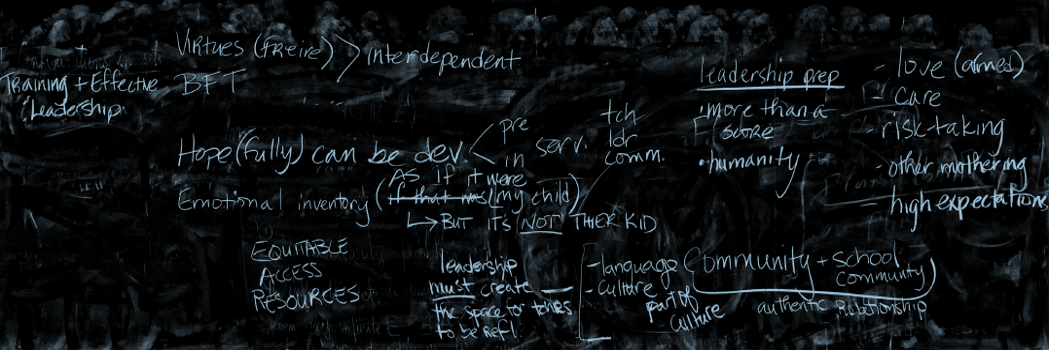This week’s readings put into words the reasons behind a lot of the hopelessness that I have been feeling as a teacher of color working in a white suburb. The first idea that resonated is that our society is based on property rights as opposed to human rights and that whiteness is the most tightly defended property of all. There are countless structural examples that point to this truth, so I don’t need to delineate them here. However, to me, it is worth mentioning how consistently shocked I find myself with the way in which educators, administrators and parents frame education as a means of securing privilege for certain children as opposed to ensuring the wellbeing of all children. After reading the Ladson-Billing and Tate article, I just kept wondering what a school that was built on human rights would look like and – as mentioned in the jamboard last week – whether it is even possible for an institution in our country to hold humanist values.
Further, as a Black teacher in a white institution, I constantly find myself feeling like it’s one-step forward and two steps back. This was beautifully explained in Dixson and Anderson’s piece as interest conversion. This has also truly come to play in the pandemic. Realizing that it is in their best interest to “address race,” my school like so many has created a Diversity Equity and Inclusion committee. Staffed by some well meaning history and english teachers and the few teachers of color in the district, we met twice to discuss how we can create a more inclusive community, but the only win I have seen is a Chinese author is coming to talk about her experiences. Meanwhile, the administration leaves untouched many policies that rarify whiteness – tracking, unjust hiring and tenure practices, curriculum control by certain parents.
My research interests are how teachers of color use their emotions to develop agency across different spaces. This ties in with the topic of this week because sometimes, like when I think about the fact that white people only allow change to occur as far as it benefits themselves and re-entrenches whiteness, I feel so hopeless. I just wonder – and think that it’s really important and interesting to study – how other teachers navigate their emotions as they watch institutions try to systematically reduce positive outcomes for Black people.




Kushya, I couldn’t agree more. I am baffled at the fact that education specifically the type of education that students receive is contingent upon how their family is situated financially. It reminds me of the charter vs public schools debate. I also feel hopeless in my pursuit to dismantle structural racism in the spaces that I occupy. In my experience, The people that need to sit at the table to unlearn the harmful information they’ve been given are oftentimes the ones refusing to do so. At this point, I am learning to find the confidence to pull from the other tenants of CRT and call out the racism and/or hypocrisy when I see it. It’s not the safest way to navigate in education but I can no longer be silenced.
You wrote the following: “human rights would look like and – as mentioned in the jamboard last week – whether it is even possible for an institution in our country to hold humanist values.” What have you personally been doing in your classrooms to foster a human rights classroom?
You write: “created a Diversity Equity and Inclusion Committee.” What does DEI work mean when it mostly involves just Black and Brown people?
And when you discuss emotions, what practices of self-care are you engaging to protect yourself from the racially violent experiences you have at work?